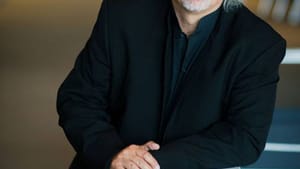Stay in the Loop
BSR publishes on a weekly schedule, with an email newsletter every Wednesday and Thursday morning. There’s no paywall, and subscribing is always free.
From Gloucestershire to Venusburg
Philadelphia Orchestra presents 'Runnicles Conducts Mozart'

Edinburgh-born, Berlin-based conductor Donald Runnicles has shown himself to be a consummate Wagnerian. A magisterial reading of the mighty overture to Wagner’s Tannhäuser anchors Runnicles’s current program for the Philadelphia Orchestra, where it plays alongside selections from the opera Hansel and Gretel, by Wagner’s devotee and pupil Engelbert Humperdinck.
Runnicles rounds out the bill with Mozart’s Symphony No. 38 in D Major — colloquially known as the “Prague symphony” — and Ralph Vaughan Williams’s decidedly Anglican Fantasia on a Theme by Thomas Tallis. The evening amounts to a musical tour of Europe.
A pilgrimage to Venusburg
Those frightened by the forbidding lengths of Wagner’s operas might explore his overtures; most contain the important leitmotifs of the scores they represent. Tannhäuser’s overture also acts as a plot précis, compressing the five-hour Große romantische Oper into a compact 15 minutes of music. The composition buoys between the opera’s themes of sacred and erotic love, with the spiritual world represented through ethereal brass and woodwinds and the sensual realm evoked by contrapuntal strings. This duality has made the piece a longtime favorite of orchestral programmers.
Runnicles presented these musical motifs with great subtlety. The opening sextet — composed of horns, bassoons, and clarinets — suggests the Pilgrim’s Chorus, sung near the opera’s conclusion. He conveyed the appropriate mood of piety and reverence, but never allowed the playing to descend into dirgelike sentimentality. Throughout this section, principal clarinetist Ricardo Morales proved once again how essential he is to the orchestra’s sound; we are lucky he came to Philadelphia from the Metropolitan Opera in 2003.
The addition of the orchestra’s full forces was occasionally overwhelming, but Runnicles ensured that the overture’s disparate sections remained distinct. The transition from the hymnlike beauty of the Pilgrim’s Chorus to the carnal abandon of Venusburg — the mythical land where Tannhäuser frolics with the goddess of love — captured Wagner’s forward-looking sense of ribaldry. When these discrete motifs became layered together in the final minutes, one could perfectly understand Tannhäuser’s dilemma: who wouldn’t want to inhabit both of these glistening, gloriously expressive worlds?
A fairy tale for adults
Because it’s mostly presented as a children’s opera these days, it’s easy to overlook Wagner’s influence on Hansel and Gretel. Runnicles, who will conduct a holiday adaptation of the work at the Met beginning December 18, foregrounded the Wagnerian elements in his reading of an orchestral suite (arranged by Omar Abad) made up of some of the opera’s best-known music.
The melodic and comforting “Evening Prayer” that dominates the suite’s Prelude recalled the more spiritual sections from Tannhäuser, while the deliciously high-octane “Witch’s Ride” suggested Wagner at his most rollicking — think “Ride of the Valkyries” or Ortrud’s unhinged “Entweihte Götter!” (“Profaned Gods!”) from Lohengrin. Runnicles consistently reminded the audience of the music’s seriousness; this was no mere juvenalia.
England and Prague
Runnicles brought unbridled beauty to Williams’s Fantasia, which was composed for the Gloucester Cathedral’s sacred space in 1910. Described by the church’s organist as “a queer mad work by an odd fellow from Chelsea” at the time of its premiere, its blend of devotional music and the English folk tradition barely raises an eyebrow today. Verizon Hall is not the ideal venue for so intimate a composition, but Runnicles used its acoustical perfection to his advantage, creating wisps of shimmering sound. First associate concertmaster Juliette Kang performed the short, gorgeous violin solo.
The evening’s only real disappointments came during Symphony No. 38, which often seemed unfocused and tended to drag. At around 30 minutes, it was one of the longest performances of this symphony I’ve ever heard. The lack of forward momentum was most evident in the concluding movement, marked presto, which sounded anything but fast.
Runnicles made his name conducting Mozart, so his sloppiness here surprised me. But the evening’s superlative dispatches from Gloucestershire, Germany, and Venusburg compensated for the wrong turn in Prague.
What, When, Where
Runnicles Conducts Mozart. Donald Runnicles, conductor. Ralph Vaughan Williams, Fantasia on a Theme by Thomas Tallis; Wolfgang Amadeus Mozart, Symphony No. 38 in D Major, K. 504 (“Prague”); Engelbert Humperdinck, Hansel and Gretel, Suite for Orchestra; Richard Wagner, Overture to Tannhäuser. Philadelphia Orchestra. Through December 2, 2017, at the Kimmel Center’s Verizon Hall, 300 S. Broad Street, Philadelphia. (215) 893-1999 or philorch.org.
Sign up for our newsletter
All of the week's new articles, all in one place. Sign up for the free weekly BSR newsletters, and don't miss a conversation.

 Cameron Kelsall
Cameron Kelsall